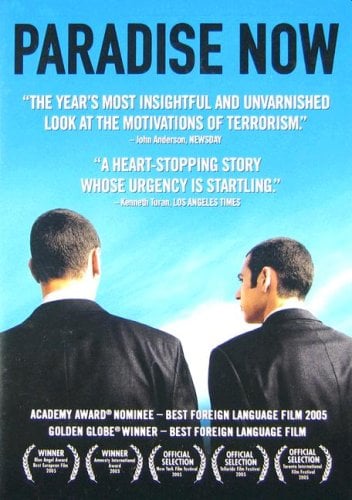This film tackles head on the situations modern Palestinians face every day.
It revolves around two West Bank friends who have been recruited to become suicide bombers in Tel Aviv.
The anguish and self doubt they experience brings the viewer closer to the minds of the would-be martyrs in the hours before they are to blow themselves up.
Since the whole movie is from the perspective of the bombers, the only Israelis one sees are those at a checkpoint and a traitor who agrees to bring the pair to Tel Aviv.
One of the questions asked is: Is becoming a suicide bomber the only way to fight against what they see as Israeli occupation?
Are there other means to wage this war?
The process of recruiting martyrs is also shown in this movie.
The pair chosen to be suicide bombers are both young men who are barely employed and who chafe under Israeli rule. They are also single and childless.
One woman, a child of a suicide bomber, tries to convince one of the young men to call off the bombing. She sees no good coming from his sacrifice.
The tension is palpable as the players in this film prepare for the suicide attack – tension from the two young men, the woman, and their handler.
One scene shows the would-be martyrs eating at a long table with their supporters around them. It is clearly filmed to look exactly like “The Last Supper” by Leonardo da Vinci.
The suicide bombers are to give their lives for a cause in the same way Christ gave his life for one.
As much as there is dialogue about the efficacy of suicide bombing, this film is not overtly political.
It brings the viewer into the lives of the denizens of the West Bank and shines a light on their daily activities.
Instead of a strident call for the end of Israeli occupation, it is subtle reminder of how Palestinians eke out a living and maintain their identity.
Each of the two suicide bombers embody the great divide in Palestinian thinking: Should we kill civilians? But aren’t all Israelis the enemy? Will my death matter? Am I contributing to a greater cause as a martyr?
There are no easy answers.
 The film leaves the viewer to decide the morality of suicide bombing and its effectiveness as a weapon.
The film leaves the viewer to decide the morality of suicide bombing and its effectiveness as a weapon.
Some lyrics to the song “God Part II” by U2 sum up the circumstances in which Palestinians find themselves: “You glorify the past/When the future dries up.”
For the two main characters in this film, the future has certainly dried up.
What is pervasive in this movie is despair, despair from not being able to make a good living, despair from being left out of the political dialogue, and despair from being forced into the margins of society.
Hard-liners on both sides of the Israeli/Palestinian situation will find something to hold onto in this movie.
However, those who struggle with the circumstances in which both sides find themselves should be disquieted by the film.
Paradise Now is available to rent.
Murphy can be reached at: [email protected]